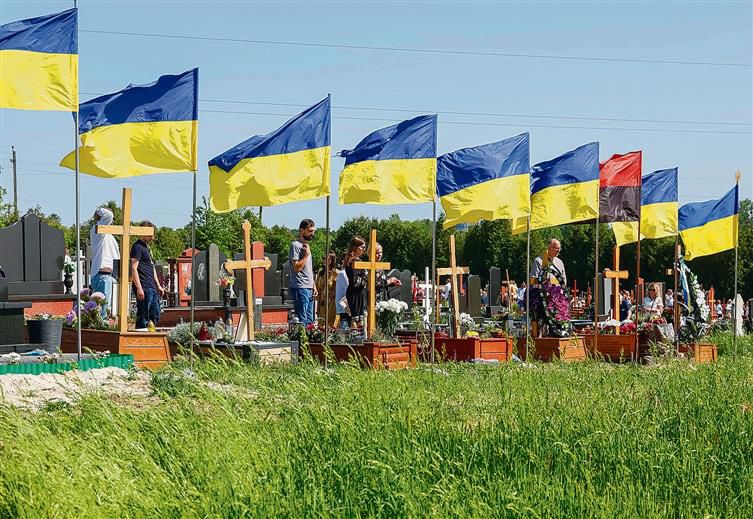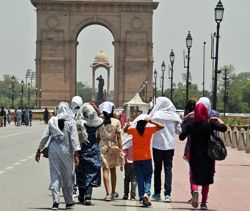
Tragedy: The Russia-Ukraine conflict owes its origin to factors for which neither nation is solely responsible. Reuters
Abhijit Bhattacharyya
Author and Columnist
WORLD history of the past 400 years shows that geographically large nations have been relatively benign or far less aggressive compared to countries with smaller territories. The latter have demonstrated a peculiar penchant for worldwide expansion — conquering, killing, plundering and profiting while redrawing maps and dividing weak nations.
No doubt Russia committed a blunder with its invasion of Ukraine in 2022. However, no war of this magnitude begins without grave provocation over a considerable period.
Take today’s 10 biggest nations in terms of area — Russia, Canada, the US, China, Brazil, Australia, India, Argentina, Kazakhstan and Algeria. They are no match for nine particular countries/empires — Portugal, Spain, Britain, France, Italy, Germany, Denmark, Belgium and the Netherlands — when it comes to overseas aggression and transcontinental imperial conquests.
Barring the post-1945 hostile posturing of the US and the post-1949 Chinese belligerence, the ‘big 10’ have largely avoided any activity aimed at intercontinental usurpation. Today’s Russia-Ukraine conflict, however, is an aberration; it is an exception to the rule owing to a combination of factors for which neither Russia nor Ukraine is solely responsible. Till 1991, both were part of the Soviet Union and never did their rulers resort to a ruthless assault on territories abroad. The Soviet invasion of Afghanistan in 1979 was an aberration as well.
Among the other constituents of the ‘big 10’, Australia and Canada were British dominions, whereas Argentina and Brazil were under Spanish and Portuguese empires for hundreds of years. Algeria came out of French clutches after being vanquished in the 19th century. India was partitioned by the British, while the 1991 breakup of the USSR led to the birth of landlocked Kazakhstan and other nations.
Contextually, one understands how and why the West felt the need for an overarching umbrella to launch a collective attack like that on Yugoslavia in 1999, and on Iraq and Afghanistan in the beginning of this century. Now, it is the bloc of nations under the North Atlantic Treaty Organisation and the European Union that is keen to prolong the Russia-Ukraine conflict at the behest of warmongers.
In the midst of the war in eastern Europe comes the proposal to hold the Ukraine peace summit at Burgenstock, Switzerland, in June. On the face of it, this is good news, yet Russia’s reported absence/non-participation makes the summit a potential non-starter because no peace move can fructify without the presence of all belligerents on the high table. Russia’s exclusion would only result in a stillborn agenda.
Germany, Europe’s most populous and second largest country, is a key member of the anti-Russia front of the West. Berlin needs to recall its own humiliation at the Treaty of Versailles in June 1919, when the German delegation was threatened that war would be resumed in five days if the draft treaty was not signed instantly. German signatories were not even allowed to sit with the Anglo-French delegates at the negotiating table. Germany must also not forget its bifurcation after World War II. Having been among the worst sufferers of 20th-century wars, Germany must put its foot down to abort any peace summit without Russia’s participation and not provoke Moscow into causing mutually assured destruction. Of late, political stalwarts of the West have virtually stooped to the level of foul-mouthed street urchins while castigating their opponents.
Let’s face it: it would be well-nigh impossible to expect the success of a peace summit on the Russia-Ukraine war without a redrawing of the map. That’s the crux, as a change of the boundary is the inevitable end result of a long-drawn conflict. One can foresee prolonged haggling and wrangling over the lingering dispute. What will be the possible shape and size of post-war Ukraine? Who will get what? Which nation could be the surprise beneficiary and which the unexpected loser?
Following the trend and pattern of Western conflicts, the partition or reparcelling of terrain is a historical inevitability. Russia aside, at least five adjacent countries (Romania, Lithuania, Bulgaria, Poland and Turkey) and the crowded Israel of the Levant could be eyeing additional ‘living space’ (Lebensraum) from Ukraine in the aftermath of a peace conference. It’s because war, peace and partition are part of a cyclical process of Europe’s past and present and there is nothing to show that the future would be any different. The formula has been consistently followed both within and outside Europe. From the Third Partition of Poland (1795) and the Congress of Berlin (1878) to the upheaval in Germany, Czechoslovakia, Yugoslavia, India, Korea, Sudan and Vietnam, all are testimony to the historical formula.
No doubt Russia committed a blunder with its invasion of Ukraine in February 2022. However, no war of this magnitude begins without grave provocation over a considerable period of time. The West has inherently been anti-Russia. Unsurprisingly, the feeling is mutual because Russia hasn’t forgotten that when it was in the throes of a civil war in 1919, a coalition of Western and Eastern forces consisting of the US, Britain, France, Italy, Romania, Czechoslovakia, Canada and Japan had invaded the newly born Soviet Union through the Siberian port of Vladivostok in a bid to break its vast landmass into pieces. Russians say that they never invaded the US, Britain, France, Italy, Canada or Japan because their land extends from the border of Vilnius to Vladivostok. Hence, Russia was neither a transoceanic nor a transcontinental imperial power. Moscow has a point.
As far as West Asia is concerned, the ongoing Israel-Hamas conflict, too, is unlikely to reverse the cartographical pattern in view of the West’s diplomatic and economic interests in the resource-rich region. But here again, there are powerful groups that want the war to continue. In this tragic scenario, peace would be a distant dream in the absence of unanimity. Hope the West and the warring nations come to their senses.
Join Whatsapp Channel of The Tribune for latest updates.




























